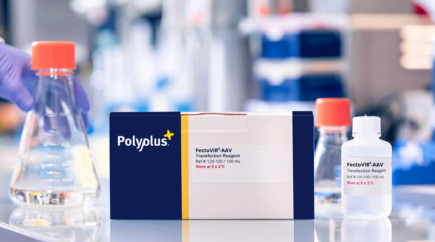Available at research and GMP grade to intensify production of recombinant AAV rAAV viral vectors at any scale from benchtop to 2000L scale bioreactor...

Bioprocessing Summit Europe took place March 22-24, 2022, with tracks on upstream and downstream processing and analytics and formulation, as well as one dedicated to gene and cell therapy CMC and manufacturing. Polyplus-transfection® not only attended the conference, but also sponsored presentations by two of our customers.
The Gene Therapy CMC and Manufacturing track examined the critical technical challenges facing the production, characterization, and quality of viral vector-based gene therapies, with dedicated sessions on product and process characterization, process development, and manufacturing gene therapies at scale.
George Buchman, PhD, Vice President, Preclinical and Process Development with Catalent Cell & Gene Therapy, discussed how Catalent has developed an informed, standardized approach for AAV manufacturing, including standardized, advanced analytical methods, that has reduced the time to the clinic for gene therapies by several months despite the complex and specialized nature of AAV manufacturing. The platform approach includes a robust upstream process that reduces downstream purification requirements, with transient transfection a crucial step.
In addition to reducing development times, Catalent is pursuing opportunities for further improvements in the scalability of AAV manufacturing, including the use of novel transfection reagents. Bhargavi Kondragunta, PhD, Director of Internal R&D and Process Development, discussed Catalent’s collaborative study with Polyplus® to evaluate FectoVIR®-AAV compared to the gold standard PEIpro® (Polyplus®) for scalable production in suspension HEK-293 cells using different AAV serotypes. The experiments using inhouse and customer-based genes of interest and AAV serotypes revealed that FectoVIR®-AAV has the potential to significantly increase both the vector genome and particle titers (3-4X or more).
In this study, process conditions outlined by Polyplus® were employed first, followed by process optimization studies at the 2 L scale using a statistical design-of-experiment (DoE) approach (plasmid DNA and transfection reagent to DNA ratios and plasmid molar ratios as variables) to determine the optimal conditions for achieving maximum yields considering host-cell DNA content and full/empty capsid ratios. Some of these processes were further scaled to 200 L.
Find out more Optimization of AAV production for high-yielding and scalable GMP processes
As a CDMO specialized in the development and manufacture of lentiviral vectors from lab to commercial scale, VIVEbiotech is constantly investing in further improvement of relevant upstream steps of the production process, particularly fine-tuning the transient transfection process. Filipe Cristóvão, Head of the USP Development Department at the company discussed the optimization of LV vector processes adapted to the development phase and considering both titer and purity as well; as scalability and cost-effectiveness.
PEIpro® from Polyplus is leveraged by VIVEbiotech because it provides optimized and scalable viral vector production in both adherent and suspension systems, affording reproducible yields across the development spectrum with three available quality grades (PEIpro®, PEIpro®-HQ and PEIpro®-GMP).
Overall, VIVEbiotech has identified several benefits of using PEIpro®, including quicker reagent conditioning, higher reagent homogeneity, reduced manual handling and thus lower risk of error; fewer steps, process robustness, easier scale up, easier integration into automated processes, and cost-effectiveness. In addition, the GMP grade is produced using a validated manufacturing process following ICH Q7 / Eudralex Volume 4, part II guidelines and provided with full documentation to support drug product approval. Furthermore, the residual assay provided by Polyplus and backed by not only scientific and regulatory support, but a professional supply chain, mitigates risk and ensures patient safety.